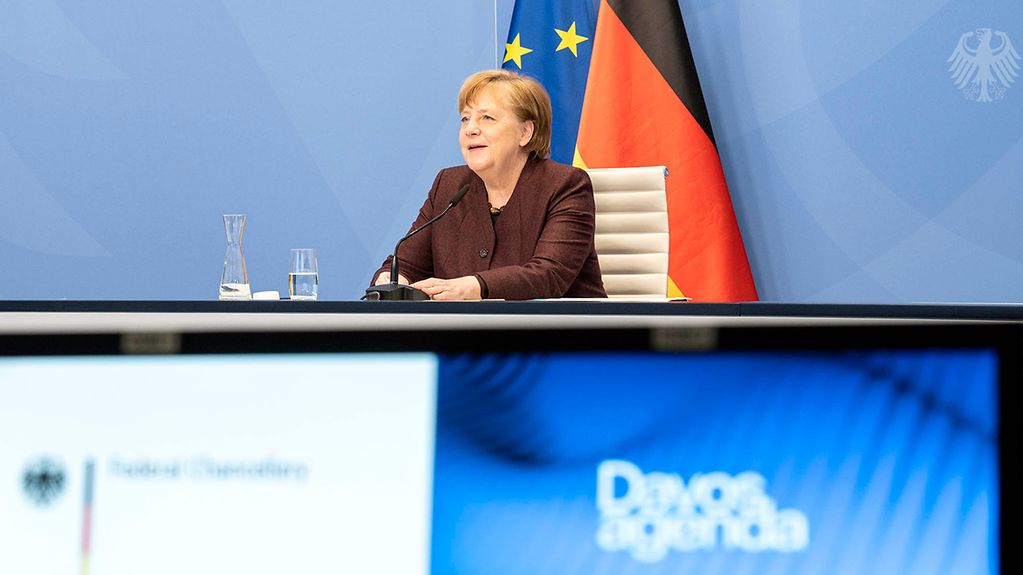The Chancellor at the online World Economic Forum in Davos
The COVID-19 pandemic has demonstrated the weaknesses of countries around the globe. Now is time to learn from this, said Chancellor Angela Merkel at the Davos World Economic Forum. In good years, we must build buffers, she said, to make society more resilient. Davos is the right place to discuss what comes after the pandemic.
3 min reading time

The World Economic Forum was held online this year because of the pandemic.
Photo: Bundesregierung/Bergmann
What has the pandemic shown us?
"One year ago today it wasn’t clear to everyone that we would experience a pandemic," said Angela Merkel. Our lives over the next few years will be shaped by the deep scars the pandemic has gouged in our economy and in our society, stressed the Chancellor on Tuesday. COVID-19 has demonstrated how interconnected we are globally. We can see this from the way the virus spread worldwide from the Chinese city of Wuhan. The pandemic is the "disaster of the century" and lays bare "the weaknesses of our societies" continued Angela Merkel.
What are our strengths and weaknesses?
"Our sense of community is our greatest treasure," said Angela Merkel. Germany is an integral part of Europe. First of all the nations withdrew within their own borders, but then they realised that it was better to act together. Processes were very bureaucratic; "adjustments" had to be made. One of the areas where we see particular problems is in the digitalisation of society. We need to be better and faster in this area. In Germany it became apparent that although we have a good health system, there is a lot we still need to learn from the pandemic, underlined Angela Merkel.
What opportunities does Europe offer?
Europe has the chance to become the first climate neutral continent, stressed Angela Merkel. "Germany now generates about 40 per cent of its power from renewables, but we also know the effort that this entails," said the Chancellor. Sovereignty is a word that is again cropping up everywhere. Supply chains are coming in for criticism. They ought to withstand even "times of great stress" declared Angela Merkel. "Supply chains must be better protected if we are to rely on them in difficult times too." The EU has a response to this exceptional crisis. It has stipulated that clear priorities must be set. More than 35 per cent of funding must be invested in climate action and about 20 per cent in digitalisation, she explained.
Why is multilateralism so important?
The United Nations summit last year demonstrated "that we are still lagging well behind expectations", said the Chancellor. Germany’s political goal is "to say very clearly, we will not economise on development work. Indeed we must step it up." When it comes to vaccines, what is important is that they are distributed fairly, said Angela Merkel, and that it is "not only a matter of money". "Of course we will do all we can to ensure a swift distribution." It has become apparent that this is the hour of multilateralism. We are cooperating transparently. "At the beginning of the pandemic, transparency was not perhaps sufficient," said Angela Merkel. The World Health Organization must be strengthened, so it is good that the USA under Joe Biden is again a WHO member.
What conclusions can be drawn?
"There is nothing good unless you do it," said the Chancellor quoting Erich Kästner. Environmental protection and climate action play a vital part. And answers are needed in the field of digitalisation. There should be a minimum level of taxation for digital companies. "The pandemic has clearly demonstrated that action is needed," said Angela Merkel. In this way the weaknesses can be overcome. She was happy to subscribe to the "preventive agility" advocated by Klaus Schwab, Executive Chairman of the World Economic Forum. "This combines two magic formulae," said the Chancellor.
The World Economic Forum is a non-profit foundation. It hosts an annual meeting in Davos, where the world’s leading economic experts, politicians, intellectuals and journalists discuss topical global issues. As a result of the pandemic, this year’s meeting is being held online. From 25 to 29 January participants will discuss the situation after the pandemic ("The Great Reset") at numerous online events. This is to be followed in May by an in-person meeting of executives, politicians and academics in Singapore.